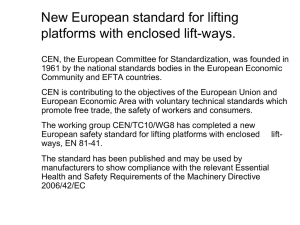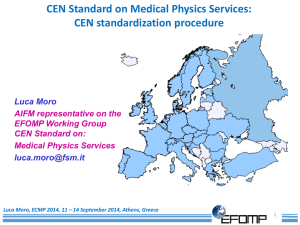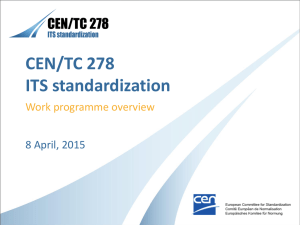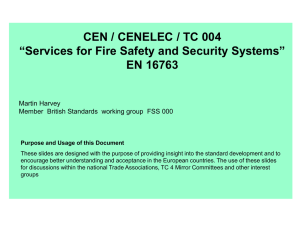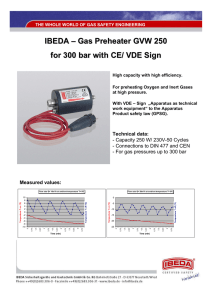Object with Holes
advertisement
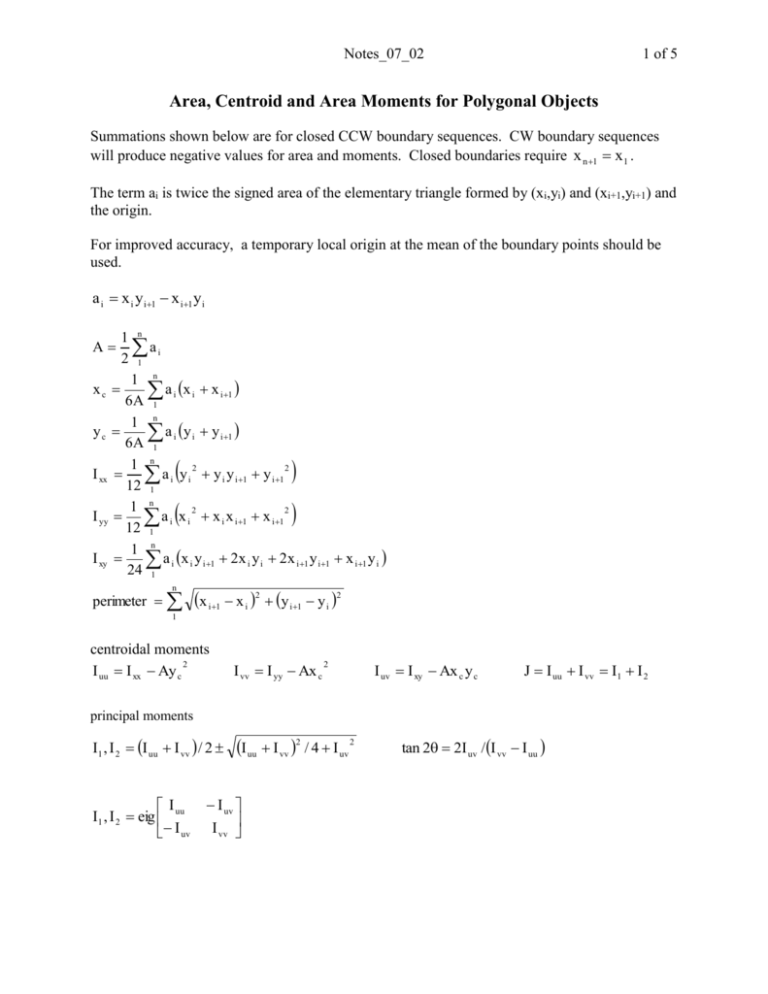
Notes_07_02 1 of 5 Area, Centroid and Area Moments for Polygonal Objects Summations shown below are for closed CCW boundary sequences. CW boundary sequences will produce negative values for area and moments. Closed boundaries require x n 1 x1 . The term ai is twice the signed area of the elementary triangle formed by (xi,yi) and (xi+1,yi+1) and the origin. For improved accuracy, a temporary local origin at the mean of the boundary points should be used. a i x i y i1 x i1 y i 1 n ai 2 1 1 n xc a i x i x i1 6A 1 1 n yc a i y i y i1 6A 1 1 n 2 2 I xx a i y i y i y i 1 y i 1 12 1 1 n 2 2 I yy a i x i x i x i 1 x i 1 12 1 1 n I xy a i x i y i1 2x i y i 2x i1 y i1 x i1 y i 24 1 A n perimeter x i1 x i 2 y i1 y i 2 1 centroidal moments 2 I uu I xx Ay c I vv I yy Ax c 2 I uv I xy Ax c y c J I uu I vv I1 I 2 principal moments I1 , I 2 I uu I vv / 2 I I1 , I 2 eig uu I uv I uu I vv 2 / 4 I uv 2 I uv I vv tan 2 2I uv / I vv I uu Notes_07_02 2 of 5 Object with Holes 1) Digitize the outline of the object in the CCW direction. Be certain to close the outline (i.e. the first and last points must be the same). 2) Digitize outlines of holes in the CW direction. Be certain to close the outlines (i.e. the first and last points must be the same). 3) Append the data strings. Remember to addend the first point in the outline to the end of each string. 4) Repeat steps 2) and 3) for multiple holes. For example, an object with three holes will contain a closed CCW outline for the object, followed by three closed CW outlines, one for each hole. Outlines for holes must be separated by the first point for the outline. 5) Area, centroid and moment computations will be correct. Perimeter will NOT be correct. Y Sample data for figure at right x_outline y_outline = = [ [ 0 0 3 0 3 3 0 3 0 0 x_hole = y_hole = [ [ 1 1 1 2 2 2 2 1 1 1 ]; ]; x y = = ]; ]; [ x_outline x_hole x_outline(1) ]; [ y_outline y_hole y_outline(1) ]; X Sample data for three holes x y = = [ x_outline x_holeA x_outline(1) x_holeB x_outline(1) x_holeC x_outline(1) ]; [ y_outline y_holeA y_outline(1) y_holeB y_outline(1) y_holeC y_outline(1) ]; Notes_07_02 % t_polygeom.m - test polygeom % area, centroid, perimeter and area moments of polygonal outline % H.J. Sommer III – 10.04.05 - tested under MATLAB v7.5.0 clear % constants d2r = pi / 180; % % % x y 3x5 test rectangle with long axis at 30 degrees area=15, x_cen=3.415, y_cen=6.549, perimeter=16 I1=11.249, I2=31.247, J=42.496 = [ 2.000 0.500 4.830 6.330 ]'; = [ 4.000 6.598 9.098 6.500 ]'; % get geometry [ geom, iner, cpmo ] = polygeom( x, y ); % show results area = geom(1); x_cen = geom(2); y_cen = geom(3); perimeter = geom(4); disp( [ ' ' ] ) disp( [ '3x5 test rectangle with long axis at 30 degrees' ] ) disp( [ ' ' ] ) disp( [ ' area x_cen y_cen perim' ] ) disp( [ area x_cen y_cen perimeter ] ) I1 = cpmo(1); angle1 = cpmo(2); I2 = cpmo(3); angle2 = cpmo(4); disp( [ ' ' ] ) disp( [ ' I1 I2' ] ) disp( [ I1 I2 ] ) disp( [ ' angle1 angle2' ] ) disp( [ angle1/d2r angle2/d2r ] ) % plot outline xplot = x( [ 1:end 1] ); yplot = y( [ 1:end 1] ); rad = 10; x1 = [ x_cen-rad*cos(angle1) x_cen+rad*cos(angle1) y1 = [ y_cen-rad*sin(angle1) y_cen+rad*sin(angle1) x2 = [ x_cen-rad*cos(angle2) x_cen+rad*cos(angle2) y2 = [ y_cen-rad*sin(angle2) y_cen+rad*sin(angle2) plot( xplot,yplot,'b', x_cen,y_cen,'ro', ... x1,y1,'g:', x2,y2,'g:' ) axis( [ 0 rad 0 rad ] ) axis square % bottom of t_polygeom.m ]; ]; ]; ]; 3 of 5 Notes_07_02 function [ geom, iner, cpmo ] = polygeom( x, y ) %POLYGEOM Geometry of a planar polygon % % POLYGEOM( X, Y ) returns area, X centroid, % Y centroid and perimeter for the planar polygon % specified by vertices in vectors X and Y. % % [ GEOM, INER, CPMO ] = POLYGEOM( X, Y ) returns % area, centroid, perimeter and area moments of % inertia for the polygon. % GEOM = [ area X_cen Y_cen perimeter ] % INER = [ Ixx Iyy Ixy Iuu Ivv Iuv ] % u,v are centroidal axes parallel to x,y axes. % CPMO = [ I1 ang1 I2 ang2 J ] % I1,I2 are centroidal principal moments about axes % at angles ang1,ang2. % ang1 and ang2 are in radians. % J is centroidal polar moment. J = I1 + I2 = Iuu + Ivv % % % % % % % % % % % % % % H.J. Sommer III - 10.04.05 - tested under MATLAB v7.5.0 sample data x = [ 2.000 0.500 4.830 6.330 ]'; y = [ 4.000 6.598 9.098 6.500 ]'; 3x5 test rectangle with long axis at 30 degrees area=15, x_cen=3.415, y_cen=6.549, perimeter=16 Ixx=659.561, Iyy=201.173, Ixy=344.117 Iuu=16.249, Ivv=26.247, Iuv=8.660 I1=11.249, ang1=30deg, I2=31.247, ang2=120deg, J=42.496 H.J. Sommer III, Ph.D., Professor of Mechanical Engineering, 337 Leonhard Bldg The Pennsylvania State University, University Park, PA 16802 (814)863-8997 FAX (814)865-9693 hjs1-at-psu.edu www.mne.psu.edu/sommer/ % begin function POLYGEOM % check if inputs are same size if ~isequal( size(x), size(y) ), error( 'X and Y must be the same size'); end % temporarily shift data to mean of vertices for improved accuracy xm = mean(x); ym = mean(y); x = x - xm; y = y - ym; % summations for CCW boundary xp = x( [2:end 1] ); yp = y( [2:end 1] ); a = x.*yp - xp.*y; A = sum( a ) /2; xc = sum( (x+xp).*a ) /6/A; yc = sum( (y+yp).*a ) /6/A; Ixx = sum( (y.*y +y.*yp + yp.*yp).*a ) /12; Iyy = sum( (x.*x +x.*xp + xp.*xp).*a ) /12; Ixy = sum( (x.*yp +2*x.*y +2*xp.*yp + xp.*y).*a dx = xp - x; dy = yp - y; P = sum( sqrt( dx.*dx +dy.*dy ) ); % check for CCW versus CW boundary if A < 0, A = -A; Ixx = -Ixx; Iyy = -Iyy; Ixy = -Ixy; end ) /24; 4 of 5 Notes_07_02 % centroidal moments Iuu = Ixx - A*yc*yc; Ivv = Iyy - A*xc*xc; Iuv = Ixy - A*xc*yc; J = Iuu + Ivv; % replace mean of vertices x_cen = xc + xm; y_cen = yc + ym; Ixx = Iuu + A*y_cen*y_cen; Iyy = Ivv + A*x_cen*x_cen; Ixy = Iuv + A*x_cen*y_cen; % principal moments and orientation I = [ Iuu -Iuv ; -Iuv Ivv ]; [ eig_vec, eig_val ] = eig(I); I1 = eig_val(1,1); I2 = eig_val(2,2); ang1 = atan2( eig_vec(2,1), eig_vec(1,1) ); ang2 = atan2( eig_vec(2,2), eig_vec(1,2) ); % return geom = [ iner = [ cpmo = [ values A x_cen Ixx Iyy I1 ang1 y_cen P ]; Ixy Iuu Ivv Iuv ]; I2 ang2 J ]; % bottom of polygeom 2008-2012 = 4032 5 of 5
